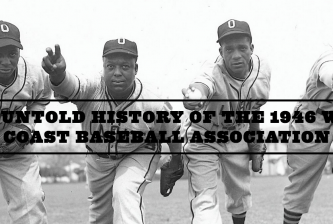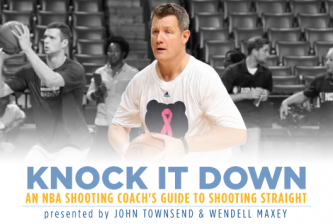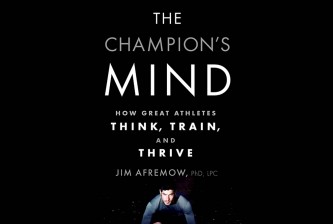Every now and again, I’ll be catching up with those who call sports or elements of sports their job, profession, livelihood — to help give those outside of the business a better understanding of what goes on around the game.
Back during my time writing for ESPN.com, former NFL wide receiver JJ Birden and I partnered on a story about his life after football and now five years later, Birden’s post NFL career continues to grow in business, as an author, speaker and always as a man who puts family first.
Thanks to the 1988 NFL Draft pick by the Cleveland Browns and 2010 University of Oregon Athletic Hall of Famer for taking the time to re-connect and take us inside the past, present and future for JJ Birden.
Walk me through a typical day/work day for JJ Birden…
Each day starts with a goal of being on purpose. I am a regimented person, and I work best with structure. It might have something to do with being a professional athlete. I plan out my schedule the night before to help me stay organized and productive the next day.
I am totally a morning person! Consequently, I hit the gym first thing. I preach and live by the words “being fit and healthy is not a fad but it’s a lifestyle.” So the morning workout is one way I represent this lifestyle. After the gym, it’s either go for a run or take Alishia, the youngest of our eight children, to school. All depends on my wife’s schedule if I am the one making the school run.
I try to be in my home office around 9 am. Due to the flexibility of having a home business sometimes that might be 10 am. Once I am in the office, I am doing a number of different things. Variety is what I love because it keeps me excited and engaged. The “JJ Birden” brand consists of “helping people live healthier lifestyles mentally, physically and financially.” I can accomplish this through my speaking platform, being a bestselling author and my Isagenix home business. Therefore, on any given day I may be working in all three of these to some degree.
So what does that consist of exactly?
Keynote speaking – If I am not speaking or preparing for a presentation, I am doing everything that leads up of my next speaking event. My speaking topics are congruent and are applicable to various organizations, businesses, schools and the athletic community. That means I am contacting prospective clients for potential speaking engagements.
Book promotions – My mentor (Dr. Will Moreland) told me once I wrote my book, that the real work is promoting it. I recognized right away this is true. Through promoting on the social media platforms, I been able to keep my books sales consistent. It’s not like I am a Hall of Fame NFL player, so I have to work hard to get the word out. Even though I played nine years in the NFL, no one’s knows you’re an author or even a speaker unless you tell them. I am determine to get my message out. As one parent shared with me, “it’s not just athletes who need your book, it’s everyone!”
Isagenix – I’ve been a professional network marketer for eight years now, and I love it. After the NFL, I was the owner of three companies in the health and wellness industry for nine years. That experience did not give me the satisfaction I was looking for emotionally or financially. Network marketing has given me more control and the time and freedom I wanted. Plus the business model revolves around your ability to help other people achieve their goals and that resonates with me for sure.
I enjoy representing the health and wellness company Isagenix. It’s the perfect fit for people looking for one of our five solutions, weight loss, energy, performance, healthy aging, and wealth creation. Isagenix has given me the vehicle to not only live a healthier lifestyle through good nutrition but also provide an opportunity for someone looking to have a home based business. There are many people out there looking for something different, or they are just “sick and tired of being sick and tired.” I try to find out what people are looking for and how Isagenix may be the vehicle to help them get it. I immediately let new customers and business partners know that nothing is guaranteed. In the NFL, it’s your physical attributes, which determine your success, however with Isagenix, you decide the odds.
It’s your commitment and effort that’s key to your success. So my job is to train, support and lead such individuals so they can achieve their health and wealth goals.
Family life is very important to me. I have an amazing wife, Raina. We’ve been married 25 years now. We have eight children total (three biological and five nieces and nephews) with six still in the house. From 5 pm to 7 pm, I try and shut it down. Raina has been instrumental in making sure we still eat together as a family whenever it’s possible. Seems to be a lost cause with many families’ today. We both recognize that these are the precious moments when we can connect with the children. With the Birden’s their usually something going on in the evening, might be bible study, game night or a family meeting of some sort. There’s never a dull moment in our house.
From time to time I may be up late still working the business. I work with quite a few in other countries and technology today makes that very doable.
Some may not know, but after you were drafted by the Cleveland Browns in 1988 and tore your ACL in rookie camp, you took on an internship with the Browns in their public relations and sales department. What was that experience like and what were you doing in that role exactly?
That was a surprise. First getting drafted by the Cleveland Browns was a shock considering I was more focused on track and field. However, the knee injury made the choice for me regarding what I would pursue athletically. When I signed with the Browns, I was one internship away from graduating from the University of Oregon. Graduating was a priority, and it was a personal goal of mine to be an NFL player who got his degree. Since I had an interest in the Sports Marketing area, University of Oregon felt working in the Browns organization qualified as my final internship.
During the off-season in the spring of 1989, I began the internship. I worked in the Browns Public Relations department first and then it was on to the Marketing department. I finished up working in their Sales department. It was an interesting perspective for me as an athlete to see these departments in action. I went from setting up interviews for players to working on marketing materials and selling season tickets in their sales booths. It was a great experience for me and an opportunity I will never forget from the Cleveland Browns.
How did that time and your Sports Marketing degree from the University of Oregon prepare you for life after football?
I believe it prepared me for the real world from a business sense. Playing in the NFL is not the real world. It’s a totally different world that is determined by your ability to perform as a professional athlete. You’re like a commodity who’s also a celebrity. Not something I welcomed or was comfortable with, but it’s park of the package. When you review the odds of making it to the NFL (High School football players .008% and College football player 1.6%) you realize the uniqueness of what you did for a living. Once the career was over, now the real world begins. During my NFL career, I started to realize sports marketing was not something I was wanted to pursue. I became more irritated with those departments as a player, and I did not want to be on the other end of it. Those departments became a bit annoying to the players during the season. Whenever we saw them, the thought was “oh what do they want now.” Their timing was never good because they always needed something right after practice, a game or some other inconvenient time. Eventually I just decided I did not want to be “that guy.” However at least, the experiences of being a student there and the education to some degree benefited me as I moved on to pursue business interests.
Playing for 9 years with 4 different teams (Cleveland, Dallas, Kansas City, Atlanta), at what point of your pro career in the NFL did you start to plan for life after football?
When you make it to the NFL at 5’10 and 157 pounds as the 216th pick in the 8th round, it takes some time for you to believe you can play in the NFL and have staying power. I spent the first few years paying off debt and starting my family. When year four came around, I said to myself, “I am still here. Let’s see if we can make it through the season.” It’s your fourth year when you become a vested player and start qualifying for retirement. Here’s a quick myth buster. Not all professional athletes are set for life financially once the career is over. Most of us need to have a Plan B for life after football. Year five was when I seriously started planning for life after football. During the off-season, I coached track at Lee’s Summit High School for three years. I wanted to test the waters to see if coaching was in my future. I also did some substitute teaching a few times to test out the teaching environment. Ironically I did quite a bit of public speaking during the off-season. Those experiences helped me become more comfortable with speaking today. However, for the most part, I networked like crazy. I made many business connections as possible in hopes of providing me with options once the career was over and that is exactly what happened!
Is it safe to say that some sports professionals simply don’t have an exit strategy, regardless if it’s football, baseball or basketball? And why do you think that is the case?
Yes! I think it’s because of the “I think this is going to last forever” syndrome many athletes get caught up in. One can get swept up with the fame and fortune that revolves around being a professional athlete. Many don’t take a realistic viewpoint that this career is temporary and can end at any moment. Therefore, it’s best to start preparing for that exit strategy right now to make a smooth transition to life after the career. I don’t want to say all athletes fall into this category because many are doing a much better job. However, there are enough athletes out there who aren’t so it’s still a concern. I encourage professional athletes today to start preparing right away.
Don’t wait, as soon as you make a team, begin thinking about your exit strategy and network like crazy.
I’m a firm believer in building yourself as your “own brand”. This is something you’ve done very well with in business ventures and your book. What excites you about the current projects you are working on?
The more famous retired professional athletes automatically have opportunities available to them. So being a less famous player, building and marketing my brand provides me the chance to market my abilities and services. Athletes, in general, are a brand. However there are many athletes out there, so it’s important to find out what’s your “competitive advantage?” What makes you different from the rest of the retired NFL players? It took me some time to figure this out, but I eventually did. Becoming an author was part of the equation. I knew I would write a book at some point because I felt I had numerous real life lessons to share. It’s taken me some time to craft the right message. Becoming America’s #1 Opportunity Trainer (a title I selected) was the perfect fit. Now that I have my bestselling book, “When Opportunity Knocks Surefire Ways to Take Advantage” out, I can now be an authority on the subject. My message is for everyone because an “opportunity” can be anything that you find of value or that’s important to you. The eight principles I share are a simple blueprint on how to seize those opportunities and take advantage of them.
What part does social media play for you in those business plans?
It’s a very important component of my business. So important that’s is part of my daily activities.
Social media continues to allow me to connect with more individuals and see how I can help them. Building relationships have always been paramount in the business world. Social media now gives us the capacity to build those relationships more conveniently and on a broader scale. As a former athlete, it’s also nice to connect with those who remember your career. I often interact with the fans who use to root me on during my high school days at Lakeridge High, University of Oregon and of course the NFL. Athletes have a “competitive advantage” due to their careers and can build up a huge following. They have instant networks built in. It would have been nice to have social media available when I was playing. As you know with my YouTube series, What’s it Like to Play in the NFL ?, I would have enjoyed providing the fans with the inside perspective.
How do you push yourself as your own boss? Where does your motivation come from?
Great question! If you asked my wife Raina this question, she’s say, “he’s not normal.” Being self-motivated has never been an issue with me. I discuss this in my book in Chapter one What’s Your Passion? I have always been passionate about being successful. Not from a monetary standpoint but I’ve always wanted to be the best at anything I do. I don’t believe in being average. The highest level of performance is where it’s at. I am aware it takes a lot of discipline to do so. I describe discipline as “the ability to do what you need to do when you need to do it while no one is watching you.” Discipline is the master key for success in anything. For athletes, it’s in our DNA. I was never one who required others to look over my shoulder and motivate me to do something. If it’s important to me, I will find a way to get it done no matter what!























